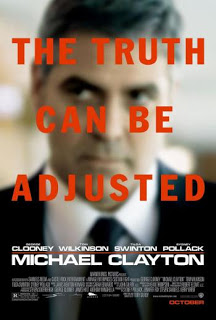Juno reviewed by Amber Leab
 It’s easy to want to live in a world like this, where a pregnant sixteen-year-old seems to get by pretty well, with her parents’ support and a relationship with her baby’s adoptive family. She has a sweet teenage love affair and doesn’t seem to struggle much. While teen angst is the stuff of Hollywood cliché, things just seemed too easy for Juno. I wish my teenage years could’ve been a bit more like Juno’s. Hell, I wish my life now could be.
It’s easy to want to live in a world like this, where a pregnant sixteen-year-old seems to get by pretty well, with her parents’ support and a relationship with her baby’s adoptive family. She has a sweet teenage love affair and doesn’t seem to struggle much. While teen angst is the stuff of Hollywood cliché, things just seemed too easy for Juno. I wish my teenage years could’ve been a bit more like Juno’s. Hell, I wish my life now could be. Atonement reviewed by Marcia Herring
 Briony’s obsession with atonement, with losing herself in the quest to right the wrongs she has committed is decidedly un-feminist. Though this is, essentially, Briony’s story, her story is consumed with the stories of others, so much so that she undergoes an erasure of self to ensure the happiness of her protagonists. Briony has been stuck for her whole life revising and rewriting her story, trapped in her youth (her hair-style remains the same), only able to present the truth upon her death, and even then her tidied up version of the truth.
Briony’s obsession with atonement, with losing herself in the quest to right the wrongs she has committed is decidedly un-feminist. Though this is, essentially, Briony’s story, her story is consumed with the stories of others, so much so that she undergoes an erasure of self to ensure the happiness of her protagonists. Briony has been stuck for her whole life revising and rewriting her story, trapped in her youth (her hair-style remains the same), only able to present the truth upon her death, and even then her tidied up version of the truth.
Any deconstruction of the traditional romantic narrative does have the potential to be feminist, however in this case, because the story is filtered not only through Briony Tallis’s obsession with that very narrative but through a male author and director, the deconstruction is seen as a loss of something good. A loss of cherished innocence, of childlike femininity.
Michael Clayton reviewed by Robin Hitchcock
 It’s a terrific performance in a rich role, but unfortunately some of that richness of character is rife with sexism, or at least relies on the sexism of the audience. We first see the character breaking down in a bathroom stall, pouring sweat broadly staining the pits of her conservative blouse. Her first dialogue is anxious practice for an interview discussing her recent promotion to general counsel as she dresses in the morning. Karen sits on her hotel bed in a practical nude bra and slip, posture slumped enough that some rolls of fat form on her midsection. Rarely is a half-dressed woman so de-sexualized in Hollywood film, and that captures our interest, but only because it relies on our presumption of sexist exploitation. So much of the complexity of the character is derived from our sexist expectations of what a cold-blooded corporate killer would be like and the “feminine vulnerability” (a phrase woefully common in reveiwers’ discussions of Swinton’s performance) of Karen Crowder. Swinton’s performance is strong enough to transcend this and actually earn the mantle of “complex villain”, but it is nevertheless problematic from a feminist perspective.
It’s a terrific performance in a rich role, but unfortunately some of that richness of character is rife with sexism, or at least relies on the sexism of the audience. We first see the character breaking down in a bathroom stall, pouring sweat broadly staining the pits of her conservative blouse. Her first dialogue is anxious practice for an interview discussing her recent promotion to general counsel as she dresses in the morning. Karen sits on her hotel bed in a practical nude bra and slip, posture slumped enough that some rolls of fat form on her midsection. Rarely is a half-dressed woman so de-sexualized in Hollywood film, and that captures our interest, but only because it relies on our presumption of sexist exploitation. So much of the complexity of the character is derived from our sexist expectations of what a cold-blooded corporate killer would be like and the “feminine vulnerability” (a phrase woefully common in reveiwers’ discussions of Swinton’s performance) of Karen Crowder. Swinton’s performance is strong enough to transcend this and actually earn the mantle of “complex villain”, but it is nevertheless problematic from a feminist perspective.There Will Be Blood reviewed by Lesley Jenike
 It’s important to pause here and mention changing views concerning the portrayal of women, minorities, the disabled, and the disenfranchised at large in American films. If we consider some of our American cinematic “masterpieces,” we often find them absent vibrant female characters, for example (think The Godfather, Citizen Kane, and Chinatown to name just three). As much as I desperately want to see my gender portrayed with respect, honesty, and integrity, many films that deal with the great American mythos don’t have much room for female characters, simply because women haven’t been a part of, and are often still excluded from, the creation story we tell ourselves—a story of brutal boots-on-the-ground capitalism and, negatively speaking, punishing exploitation. It’s a Judeo-Christian story in which the individual male forges his path through the wilderness, an anti-hero who, despite his great wealth and power, can’t overcome his subsequent moral corruption. What’s important to recognize is that the marked absence of “the other” in these films is a comment on an institutionalized patriarchy that extends beyond our everyday interactions to the very heart of our cultural mythos. There Will Be Blood is yet another film that further cements a white male-dominated American story of origin.
It’s important to pause here and mention changing views concerning the portrayal of women, minorities, the disabled, and the disenfranchised at large in American films. If we consider some of our American cinematic “masterpieces,” we often find them absent vibrant female characters, for example (think The Godfather, Citizen Kane, and Chinatown to name just three). As much as I desperately want to see my gender portrayed with respect, honesty, and integrity, many films that deal with the great American mythos don’t have much room for female characters, simply because women haven’t been a part of, and are often still excluded from, the creation story we tell ourselves—a story of brutal boots-on-the-ground capitalism and, negatively speaking, punishing exploitation. It’s a Judeo-Christian story in which the individual male forges his path through the wilderness, an anti-hero who, despite his great wealth and power, can’t overcome his subsequent moral corruption. What’s important to recognize is that the marked absence of “the other” in these films is a comment on an institutionalized patriarchy that extends beyond our everyday interactions to the very heart of our cultural mythos. There Will Be Blood is yet another film that further cements a white male-dominated American story of origin. No Country For Old Men reviewed by Anna Rose
 Of course, when I say “something to do,” I mean “a grand total of ten minutes’ screentime, all of it oriented to onscreen husband Brolin.” As Carla Jean Moss, Macdonald bears an expression of chronic worriment to rival Jones’s, and almost all of her scenes require her to do nothing more than fret at Brolin, asking him for guidance or expressing concern for his safety.
Of course, when I say “something to do,” I mean “a grand total of ten minutes’ screentime, all of it oriented to onscreen husband Brolin.” As Carla Jean Moss, Macdonald bears an expression of chronic worriment to rival Jones’s, and almost all of her scenes require her to do nothing more than fret at Brolin, asking him for guidance or expressing concern for his safety.
In a way, Carla Jean ties the film together, but she does so solely in terms of the male characters: she is the only character to share screentime with all three of the main characters (who never appear onscreen together). Occasional hints are dropped regarding her life outside of the men–“I’m used to lots of things. I work at Wal-Mart”–but, frustratingly, these are not expanded in any way. Only in her final scene does she talk about something other than Llewelyn.





